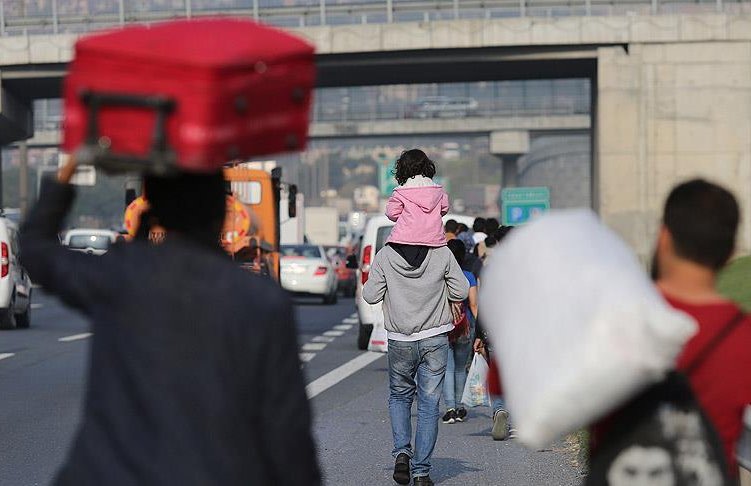Photo: AA/File
Click to read the article in Turkish
The Social, Economic and Political Research Foundation of Turkey has released the results of a new study entitled "Perceptions and Attitudes towards Syrian Refugees in İstanbul: Partisanship, Xenophobia, Threat Perceptions and Social Contact."
A significant part of the people in İstanbul, a city of 15.4 million people, avoid social relations with Syrians and culturally otherize them, the study concludes.
According to recent figures by the International Organization for Migration (IOM), there are about 1.6 million foreign immigrants in the city, with nearly a million Syrians.
According to the study:
• İstanbulites, in general, have extremely negative feelings towards foreign immigrants, Syrians in particular. The share of respondents who said they wouldn't be disturbed by Syrian families moving to their neighborhood was 27.10 percent.
• While İstanbulites encounter Syrians very often in daily life, the share of those who have close and regular relationships with them is only 6.34 percent.
"Preferential treatment"
• 66 percent of the respondents said, "Syrian refugees are people who receive preferential treatment compared to Turkish citizens" and 64 percent said, "Syrian refugees are people who are a burden to us economically."
• As concerns about the country's economic trajectory increase, so do negative feelings towards Syrians.
• 58.53 percent of the respondents who agreed that there is a "religious fraternity" between the people of Turkey and Syrian refugees also think that Syrian refugees are a burden to the country's economy.
Citizenship of refugees
• A common complaint about Syrian refugees voiced in focus group interviews was the claim that Syrians make it harder for locals to use parks, gardens, playgrounds, shorelines and other public places.
• 41.64 percent of those with a monthly household income above 7,500 lira (869 USD) support the conditional citizenship of Syrian refugees. This rate drops to 18.28 percent among those whose monthly household income is below 2,500 lira (289 USD).
• Refugees' knowledge of Turkish is a limited but influential factor in locals' view of them, which indicates that steps to be taken for the benefit of Syrians from Turkish language courses and educational opportunities can contribute to social cohesion.
Most common threat perceptions
• While there are some differences in the view of Syrians among the voters of different parties, threat perceptions are common among all of them, according to the study.
• Voters of the Peoples' Democratic Party (HDP), a Kurdish issue-focused party, are the most open to having social relationships with Syrians and the most biased voters are those of the Republican People's Party (CHP), the secularist main opposition party, the Nationalist Movement Party (MHP), and the İYİ (Good) Party, a splinter movement of the MHP.
• The most common threat perceptions of İstanbulites towards Syrian refugees are that they reduce job opportunities for locals (70.81 percent), they disrupt the demographic balance by having many children (66.13 percent), they pose a threat to the modern way of life (59.86 percent), making it harder to benefit from public spaces and services (59.43 percent).
Support to government policies
• 35.49 percent of the respondents said Turkey's "open door" policy towards Syrians in the first years of the war was right. Those who think that policy was right are also a minority among the voters of the ruling Justice and Development Party (AKP).
• About a question on the settlement of Syrians, the most common answers were "They should be settled in safe areas to be established in Syria" (25.54 percent) and "They should be settled in refugee camps to be set up in Turkey" (22.88 percent). (KÖ/VK)





kjhbkhb.jpg)


